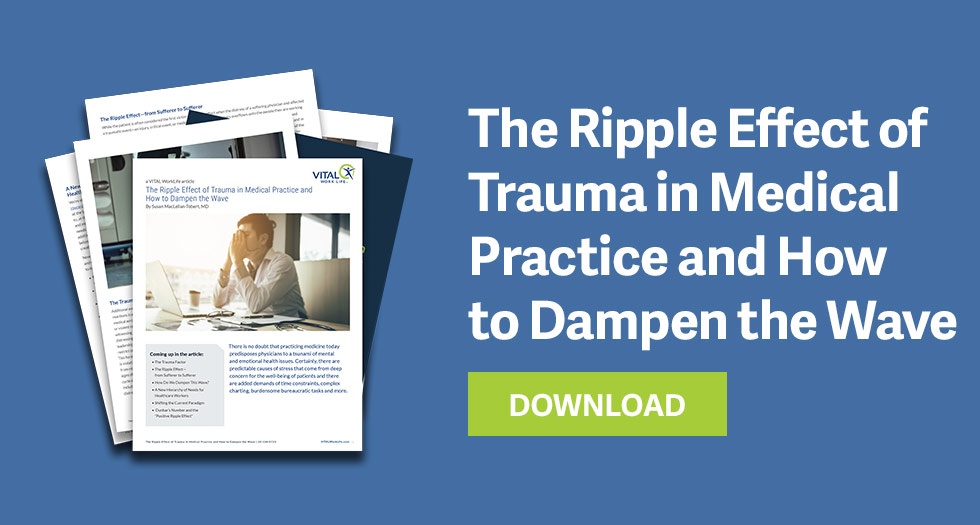In thinking about and responding to the mental and emotional health needs of physicians and healthcare practitioners, it’s important to understand that while their patients have often suffered psychological trauma, practitioners can experience it as well.
Physicians are familiar with physical trauma, of course; it’s any serious physical injury, such as a widespread burn or a head injury. Psychological trauma is less familiar and certainly less talked about.

The American Psychological Association’s Dictionary of Psychology defines psychological trauma this way: “Any disturbing experience that results in significant fear, helplessness, dissociation, confusion, or other disruptive feelings intense enough to have a long-lasting negative effect on a person’s attitudes, behavior, and other aspects of functioning. Traumatic events include those caused by human behavior (e.g., rape, war, industrial accidents) as well as by nature (e.g., earthquakes) and often challenge an individual’s view of the world as a just, safe, and predictable place.”
Traumatic events a physician may experience include medical errors, patient deaths, violent encounters in the clinical setting and even prolonged exposure to patients’ suffering.
The latter category of trauma shades into secondary trauma, which the Department of Health and Human Services (HHS) defines as “a natural but disruptive by-product of working with traumatized clients. It is a set of observable reactions to working with people who have been traumatized and mirrors the symptoms of post-traumatic stress disorder (PTSD) (Osofsky, Putnam & Lederman, 2008; Figley, 1995). Many types of professionals, such as physicians, psychotherapists, human service workers and emergency workers, are vulnerable to developing this type of stress, though only a subset of such workers experience it.” Symptoms may include feelings of isolation, anxiety, dissociation, physical ailments and sleep disturbances.
In the medical profession, this vicarious trauma has been dubbed “second victim/second sufferer syndrome.”
Second sufferer syndrome and burnout are distinct; experiencing repeated traumas may contribute to burnout, but burnout may also be the result of overwork and job stresses unrelated to trauma. Yet both conditions can give rise to a “ripple effect,” in which the affected physician extends and impacts those with whom they work and live with in a negative way.
In my article The Ripple Effect of Trauma in Medical Practice and How to Dampen the Wave, I explore the sources and consequences of this ripple effect in healthcare organizations and physicians’ lives. It also lays out a theoretical and practical blueprint for rethinking medicine’s response to physician trauma and physician pain. Check it out here.



